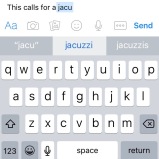My iPhone is biometrically coded, offers encryption that baffles the FBI, and can connect me to global news and networks that defy the reach of political censorship. But it does want me to capitalise ‘Polaroid’:

Digital freedom means many things, but apparently not the right to appropriate trademarks.
The extent to which registered trademarks enter common language, or “genericisation”, is one of the hard knot of editing issues, along with libel and legal reporting, where editors can really earn their money – high-stakes prescriptivism, so to speak. Lawyers representing dominant companies live in fear of their trademarks becoming nouns or verbs that define an entire market, not just their clients’ products (see, for example, “googling”, “photoshopping”, “thermos”, “sellotape”, and once, long ago, “aspirin”). Once a word has “entered the language”, the courts are inclined to take that as a fait accompli and deny any further copyright infringement cases; so the lawyers have to act fast and early to prevent genericisation ever happening. They email, write, phone, demand corrections, suggest alternatives (Velcro likes you to say “hook and loop fasteners”). They are language change’s sharpest and best-resourced opponents.
And that’s why the Tribune’s style guide on the issue says the following:
trademarks (TM)
Take care: use a generic alternative unless there is a very good reason not to, eg ballpoint pen, not biro (unless it really is a Biro, in which case it takes a cap B); say photocopy rather than Xerox, etc; you will save our lawyers, and those of Portakabin and various other companies, a lot of time and trouble
The editor’s natural interest in enforcing distinctions chimes well with the lawyers’ determination to have them enforced, even if the legal vigilance gets a little grating at times. Portakabin, notably, used to send round a letter a week before the summer music festival season – long before any transgression had actually taken place – to “remind” editors that their clients did not provide the toilet facilities for Glastonbury, so on no account were festivalgoers to be described as using “Portaloos”. This would reliably cause the kind of grumbling, even among hard-nosed copydesk veterans, that one might almost have described as descriptivist. However, one can see the point: in court cases, one of the determining factors of a word being deemed to have entered the public domain is to what extent it appears in a general sense in media reports.
That said, it’s still not entirely clear what Apple is hoping to achieve with its suggestions on QuickType (as the predictive typing aid in iOS9 is called). As an experiment, I tried out Facebook Messenger with single-word nouns given as trademarks in the Tribune’s style guide.
Whenever it recognised the word (it didn’t in all cases), QuickType invariably suggested an initial cap, with the sole (and slightly baffling) exception of Jacuzzi (trademark of the company founded in 1915 by Giocondo Jacuzzi in Berkeley, California.)
But is that enough? As the style guide suggests, the best practice when trademarked words come up is to change them to a generic alternative – at least, better practice than scattering the copy with ™s and ®s. Is a capital letter, without more, enough to escape accusations of aiding genericisation? Is the fact that your operating system is suggesting a semi-proper noun less likely to annoy the lawyers, or more?
It might be argued that proposing some acknowledgment of copyright is enough to absolve you of blame; certainly better than offering a lowercased suggestion. But the best practice recommended to lawyers is to use the trademark as an adjective not a noun (“Xerox brand copiers”), and QuickType seems happy to suggest nouns. It may be that QuickType is following the dictionary practice of capitalising trademarked nouns when defining them; but dictionaries always quickly make clear that such words are trademarks, and QuickType does not.
In the end, the genericised fate of escalator, kerosene, laundromat and trampoline suggests that the battle – like nearly all battles against language change – may be futile. Certainly, Xerox have fought doughtily against “xeroxing” as a verb and kept their trademark protected: but there are many fewer photocopiers in today’s broadband-connected offices than there used to be, and it may be that the word will die out with the practice. But in the meantime, the letters will keep on arriving. And the lawyers aren’t the amateur grammar grumblers of the letters page: these people peeve for a living.





